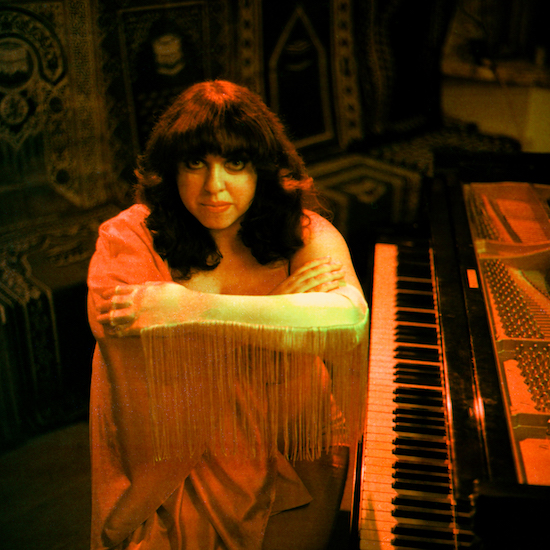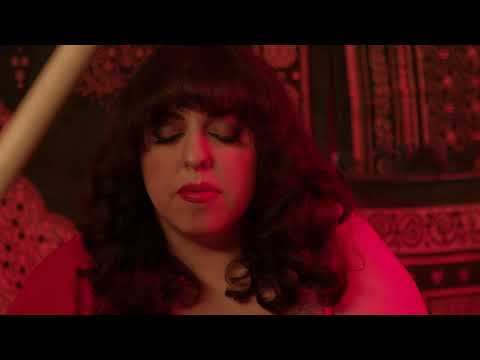Donia Jarrar portraits by Adrian Hernandez
It’s a hot day in a too hot summer for much of the Northern Hemisphere, but in Los Angeles Donia Jarrar sits on a cafe’s back patio and thinks of a different place, and how it reminds her of a woman she never had the chance to meet.
"In the hallway growing up in Egypt, we had this small two-bedroom apartment," she recalls, "There’s a photograph of my grandmother and it’s black and white, and it was very stoic. In those times, in the fifties and forties, they took pictures that were very stoic. People didn’t smile.
"But her hair was very dark, jet-black and straight. When I imagine her, I imagine the silhouette of that image and then her hair flowing. The landscape of Palestine is very similar to Los Angeles, there’s these rolling mountains, they roll in the shape of her hair. I remember being in Palestine and seeing the hills for the first time when I was nine or ten, and then I’m remembering that photograph of my grandmother. I feel like that’s a very good summary of how my brain relates my past and landscape to my music."
Over the past few years Jarrar has demonstrated the relationship through a series of remarkable releases under the name Phonodelica. Her first album using the name, 2019’s Hidden Assemblages, readily blends the space between the classical piano she was trained in; new music in general in that classical sense; general sonic experimentation; and production, oral histories and activism on a wide number of fronts.
While it can be found along with her other work on Phonodelica’s Bandcamp page, Hidden Assemblages will also be rereleased in the near future on Deathbomb Arc, the California-based label that’s been the wider launching points for such remarkable acts as Clippng. Meanwhile, Jarrar continues to work on new approaches for Phonodelica in general, one of the more striking examples of artistic endeavour of this still young decade.
Jarrar’s own life story traces many mixed paths. She was born in Kuwait to her Egyptian mother and Palestinian father, but the family fled to Egypt in the wake of the Iraqi invasion that resulted in the Gulf War. From there they ended up in New York City in 1992, setting Jarrar on her general life course living and working in America. At a young age in elementary school, she also learned a little too clearly about how even in pre-9/11 days assumptions and stereotypes could run rampant.
"I was in second grade, and it was two separate things that happened in the same week, and it really, really fucking pissed me off," she notes with a mix of can-you-believe-it wry humour and deeper feelings. "The first one was we were supposed to sing the Pledge of Allegiance. Even as a seven-year-old girl I could intuit that it’s weird, uncomfortable. I think the first time I had to sing it, everyone was singing and at the end I went, ‘Jesus Christ!’ (I was hearing that around me, my siblings are much older.) The teacher turns to me and she goes, ‘Donia, do not say the Lord’s name in vain.’ I was like, ‘But he’s not my Lord! I’m Muslim!’ ‘Oh, you are?’ ‘Yeah!’ So that became a whole thing!"
"Then later that week, a history teacher was like, ‘We have a Muslim student in the class, so why don’t we do a whole class on Islam?’ So I go to the class, and the teacher has printed a piece of paper out with a picture of who’s supposed to be the prophet Muhammad. The picture itself was a side profile of a fat guy, which is totally fine, whatever, but a fat guy with a big hook nose. It was pretty antisemitic, and he had an "M" pin he was wearing.
"I’ve always been very outspoken. I’m not a shy person at all! I got really impassioned and that was the first moment that was a ‘Donia moment’: ‘This is wrong!’ At home, I showed my mom. She ended up going and talking to the school and being like, ‘You really offended my daughter and me.’ That was the first moment I realised I was marginalised."
Jarrar’s mother not only had her back but was also the key source of early musical inspiration for her, due to her own training in piano, which led to a position at the conservatory in Alexandria. "My dad fell in love with her, seeing her play piano," she remembers fondly. "She also studied science, microbiology, at the university there," noting further that the feminist and activist Nawal el Saadawi was a wider lodestone for her mother and for Egyptian society in turn.
Jarrar remembers playing an upright Kawai piano in Kuwait before their move, also describing an amusing moment later in the US when her parents mistook her request for a guitar for a ‘gitar’ – an Arabic word for ‘train,’ leading them to get her a toy set much to her confusion. "They’re both these gendered asks too, because usually boys play with trains and usually boys play guitar," she observes. "So I think the way that they translated that was super-interesting."
Jarrar’s older siblings, besides introducing her to the joys of swearing in English, also served as key musical guides for her younger years in the late 90s and early 2000s. She especially credits her sister, seven years older than her, for many key introductions, recalling how they rode together in her car on her sibling’s run to a local Virgin Megastore to pick up new releases by such musicians as Tori Amos, Erkyah Badu and Björk.
"I was ten years old; my friends were like, ‘What is this weird music?’ I was making them listen!" she recalls with a laugh. "When Vespertine came out, I think I was 15. All of my friends in high school were just like, ‘This sucks. This is fucking weird.’ I was like, ‘You’re just not cool.’ I’m still friends with some of them. But they were just like, ‘Why are you making us listen to this weird alien lady?’"
Amos and then some years later figures like Kate Bush and Nina Simone became deeply important for Jarrar, saying that "any time there was a woman playing piano" she was on it as soon as she learned about it, further crediting Simone for her own outspoken forthrightness in general as a strong model. She recalls "literally going to the library at my high school and Ask Jeeves–ing ‘female musicians’ and ‘feminist music’. I did a lot of research to figure out who was who when I went back to Kuwait as a teenager, just constantly trying to find people to aspire to." Meanwhile, her further study of piano led to an academic path at the University of Michigan, earning both her masters of arts and eventual doctorate there in musical arts.
The path that Jarrar took could lead to a standard enough role in academia somewhere as a result, mixed with the world of modern classical composition, and she’s built up a wide variety of credits throughout the US including vocal coaching, opera commissions, academic conferences and much more besides. But for her, the mixture of her own history and a sense of wanting to capture and tell the stories of others not often heard has also led to a wide variety of collaborations and participation in larger cultural and activist ventures in the Middle East.
Jarrar’s role as a pioneer there dovetails further into her own experiences with navigating the world not merely as a woman but as an openly queer/bi person as well, something which she notes has led to strange ironies in the realms she works in. "There’s the gaze of everyone from the outside looking in, but then there’s also the internal gaze of my culture, and just in general patriarchal cultures, and how women are portrayed there," she notes with feeling. "The sexism I’ve dealt with back home is so strong. I’ve been in rooms with Palestinian men who I literally recorded improvised piano pieces for the collaborative projects, and then had them say stupid shit like, ‘We don’t have a good pianist here.’"
In the US, she notes other issues that can arise in both the new music field in general as well that of orchestrations and other commissions that can provide further support, describing a recent incident in Los Angeles where a pianist initially reached out about commissioning a piece only to beg off later due to her overall work. Referencing the late Toni Morrison’s description of herself as an American author first and foremost, she elaborates further: "I think I just got pigeonholed as the Muslim composer or the Arab composer. I don’t want to erase my own identity, it’s fine if people say that I’m a Palestinian-Egyptian. I prefer that, because that’s important to me. I also find that if you just say ‘she’s an American composer,’ that’s fine too. But I don’t want to just be seen as that one Palestinian composer. Because I actually have a multitude of skills and strengths that are not just related to where I’m from."

All this work intertwines into her compositions and recordings, with Hidden Assemblages being in real ways an exact balance between everything she’s done, resulting in a detailed album that feels of one flowing piece, a true headphone listen in its specifics. Jarrar’s piano playing serves as a central core for most of the album, but there’s a constant shifting of elements, ranging from murmuring tones and a sense of open space to recorded observations comparing Black American and Palestinian experiences to a field recording of a border crossing. Jarrar herself breaks down what she sees her work as being with a prioritising of that audio verite element:
"The first thing is oral history, storytelling, the capturing and documenting of community experiences. In a lot of my music there’s a function of the piano or the electronics or whatever medium I’m working in functioning as a drone and creating a soundscape. Then there’s the improvisational component and the actual performance aspect, the playing aspect, either solo or with other people, the freedom to actually sit and perform and play unbound. Those three things come together to form most of my works: they’re ethnographic, they’re poetic, they’re performative, and people’s personal histories and stories play a large part in what I do."
The sonic richness of Hidden Assemblages makes the album a remarkable listen precisely because it never seems to simply be ‘just’ music even at the same time that melodic and other elements provide the key anchors for a listen. A large number of collaborators flesh out the whole experience, including various classical string performers and percussionists, while a recording of "Border Crossings" is sampled and used in "I’m a Mermaid At Your Door," creating a greater textual depth. In turn the whole album is inspired by and was partially created as the score to the director Fawzia Mirza’s Five Times A Day film, and the director contributes a spoken word part to ‘The Black Stone’. Hidden Assemblages is never quite one exact thing in the end.
"The whole process of how I work through certain pieces and recordings and all of that, it’s definitely an experimental process," Jarrar reflects. "A lot of the stuff in Hidden Assemblages, I’m just playing around with electronics. A lot of it will come while I sit for hours and hours and fiddling with everything, all the filters and the processors. Then it’s like, ‘Oh, this sounds amazing. So let’s just take it and run with it.’ But then with piano stuff and improvisation, I think traditionally in terms of form as a classically trained musician. I definitely work with form, it’s not all free."
In what proved to be the unknown run-up to COVID’s worldwide impact, Jarrar then planned on another collaboration, this time with Yemeni-American artist Yasmine Nasser Diaz, who explores questions of identity in her own visual work and installations, touching on code-switching and what Jarrar describes as a "love letter to her sisters, cousins and all the young people" who share her background. "She really inspires me," says Jarrar, "and she’s also a drummer. We wrote five songs together, we had been practicing really hard, and we were going to premiere them last May. Then coronavirus hit, and so we never went to the studio."
Phonodelica’s next releases in 2020 were both responses to such circumstances – Preludes For Social Distancing, a collection of largely instrumental piano pieces recorded at home on her iPhone as the COVID shutdowns began to take wide effect, and the quietly harrowing ‘Firelight Demo (For Beirut)’, a fundraising track composed and released in the wake of the destructive port explosion there that summer.
Early 2021 saw Phonodelica return to a wider project: Seamstress, drawing on a wide series of oral histories and interviews Jarrar conducted with Palestinian women across differing generations between 2012 to 2017. A soundtrack to what she terms the ‘documentary opera’ of the same name that she’s created, it reflects the further collage of sources and experiences in that visual medium, with Jarrar further describing an example of the overall integration:
"The first ten minutes of it specifically, I recorded all the music, the improv, with [vocalist/oudist] Huda [Asfour] for it first. I knew that I wanted to use our music against colonial footage. There was this famous footage that came out, I think in 2016, of 1896 Jerusalem and the Palestine railways. There was this British commentary, the clip is someone saying, ‘Arabs and Jews are working together at piecemeal rates.’ I thought, ‘It would be really amazing if I overlaid two women musicians improvising over this video; that would be magical.’ So that’s what I ended up doing. The music came first, the video came second.
"The video component of the piece, the opera, has all the translations for what everyone’s singing. If you’re just listening to it, I’ve gotten feedback from people saying, even the ones who don’t speak Arabic, they prefer just listening to it without the video because they can be really immersed in the music itself. That was really interesting for me to hear."
Jarrar has now begun to showcase a new Phonodelica project, entitled Into The Ether And Out Of Our Anguish, which she has described as an effort with a similar blending of elements – solo piano, string orchestrations, field recordings and interviews and collaboration with others – that is ultimately designed as "a form of healing," portraying "an imagined future where Palestine is free, fluid and formless, existing in the ether of our dreams and consciousness." These words come from the liner notes to the first released track from the overall composition, ‘Offerings | قربان’, a flowing piano instrumental.
"I would love to play festivals and just do all these solo performances, just me and the piano, maybe some electronics," Jarrar says in response to a question about further future artistic work beyond Into The Ether. "Then I would love to actually do an album of just songs where I’m singing. I have a lot of songs I’ve written that I haven’t really released just because I’m a ‘serious composer’. I always feel like I’m a pianist. But I would like to go there, and I would like to do that."
Jarrar goes on to say that an ideal situation would be to have an artistic collaborative organisation like Janelle Monae’s Wondaland group, while she also expresses great pride in her participation in the latest work by Chrystia Cabral, better known as SPELLLING, whose The Turning Wheel is one of the year’s best in its own right. Whatever else is next for Jarrar, it’s already an involved and strikingly unique path – and she still has some other artistic goals in mind, as she notes while discussing the creative work needed to create orchestrations:
"Orchestrating is so difficult, my god, but it’s so fun. In writing orchestral music and anything contrapuntal, it’s like solving a puzzle, or a Rubik’s cube, because my music is tonal. Even "Checkpoint," which was the noisiest thing I’ve made, is still pretty listenable. I would love to do more noise-based stuff, like just pull a fuckin’ Merzbow. I’ve always wanted to do that!"



